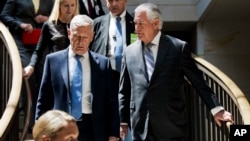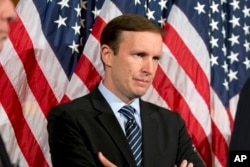U.S. senators urging new congressional authorization for the use of military force (AUMF) in the Middle East and elsewhere made little headway convincing a skeptical Trump administration during closed-door discussions Wednesday, participants said.
"There's an unbridgeable difference between the administration and many members of this committee," Democrat Chris Murphy of Connecticut told reporters as he emerged from a classified briefing by Secretary of State Rex Tillerson and Defense Secretary James Mattis to the Senate Foreign Relations Committee.
"They don't believe they need an authorization. Many of us believe they do," Murphy added.
The U.S. campaign against Islamic State, begun under former President Barack Obama and intensified by President Donald Trump, is one of several that rely on Congress' open-ended 2001 authorization to hunt down terrorists after the 9/11 attacks on the East Coast.
Further use
Over the last 16 years, that AUMF has been used as the legal basis for at least three dozen U.S. military operations in 14 countries.
It remains valid today, according to the White House. Neither Tillerson nor Mattis spoke with reporters on Capitol Hill, but the administration made its views known.
"The administration is not seeking revisions to the 2001 AUMF or additional authorizations to use force," the State Department's Bureau of Legislative Affairs wrote in a letter to the committee's chairman, Republican Bob Corker of Tennessee. "The United States has sufficient legal authority to prosecute the campaign against al-Qaida and associated forces, including against the Islamic State of Iraq and Syria (ISIS)."
Senators of both political parties disagree.
"Under the Constitution, this is Congress' responsibility, and it has been years since we have considered an authorization for the use of military force," Republican Susan Collins of Maine told VOA. "And yet we have troops in trouble spots all over the world. To say that all of those are permissible under the 9/11 AUMF is a stretch. It's time for a debate on that."
"We need a clear strategy from the administration about the counter-ISIS fight, our path forward in Afghanistan and our path forward in Syria," said Democrat Chris Coons of Delaware. "It is our job as Congress to either authorize or deauthorize these conflicts."
Failed effort feared
Some are not opposed to a new AUMF in principle, but worry that Congress will be unable to agree on specific language, leading to a failed effort that sends a message of disunity from Washington, or will make stipulations that undermine military operations.
"Our objective is to defeat, destroy groups like ISIS with no time constraint. If we can only come up with an AUMF that ties this or a future president's hands, I would not support it," said Republican Ron Johnson of Wisconsin. "The troops would appreciate Congress weighing in, but not in a manner that would restrain their ability to defeat this enemy. That's the conundrum."
Some committee members expressed hope for further dialogue with the administration.
"I think those conversations will continue," said Republican Cory Gardner of Colorado. "I don't think anything was decided or concluded [in the closed-door briefing]."






